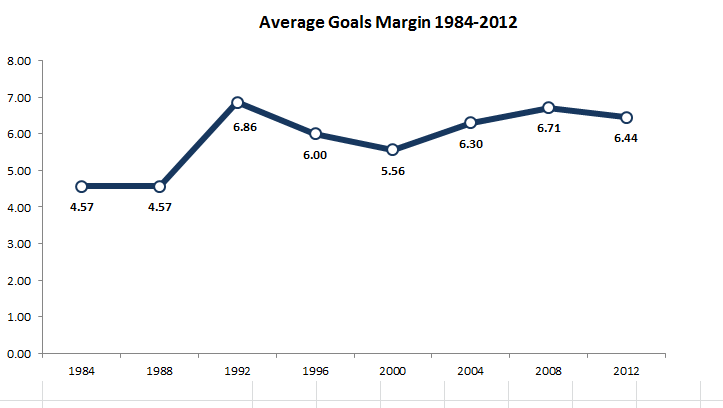On the 17th of October 2007 a Kazakh midfielder named Dmitry Byakov did something quite unique. In the last minute of play against Portugal, he scored what was to become the only goal any bottom seeded nation would get against a top seed in qualification stage for the 2008 European Championships. In 14 matches of top versus bottom and 1260 minutes of play, Byakov was the only footballer to hit the back of the net for any of the minnows.
After sitting through Ireland’s 7-0 thrashing of Gibraltar last weekend and watching both Deirdre McCloskey and Thomas Piketty thoughts on capitalism for the trip home, I got thinking about inequality across European International football.
Sports economists are quick to stress the role of uncertainty in sport. Not knowing an outcome for sure is critical to maintaining competitiveness and vital to the credibility of competitions. We're commonly reminded of this need in International football contests. Like at the weekend for Ireland, there can be a complete talent mismatch. Great inequalities in ability create a near certain outcome and there is very little competitive balance in once of matches. Handicappers ensure that horse races are fair and boxing disparities can end very quickly. Unlike these sports, the option to constrain one opponent or throw in the towel early doesn't exist in football.
So what does the ‘inequality gap’ look like in European International football? I collected the dataset for European Championship Qualifiers from 1984 to 2012 and analysed the matches between the top seeded team in the group and the bottom seeded team. There were 64 groups and 127 matches in total (an odd number as Albania forfeited a match to Spain in 1992 due to political problems ...and maybe because of their earlier 9-0 thrashing!).
The measure I used to judge inequality is the margin in goals scored across the 180 minutes of play between the top and bottom seeded teams. The usual names crop up as top and bottom seeds. Germany, Italy Spain etc. versus Andorra, San Marino, Malta etc.
The graph of the average margin is below. The gap between the biggest and the smallest since the 1980’s is on the rise. While the top seed beat the bottom seed by about 4.5 goals on average over the two games in the 1980’s there is approximately a 6.5 goal difference now. The average number of goals these bottom teams score per match since 1984 has never reached one.
There was only one incident in the dataset out of 64 groups when the margin was negative i.e. the bottom seed outscored the top seed over 180 minutes. In the Euro 96' qualification campaign Sweden the top seed were beaten by Turkey 2-1 and also drew 2-2. The greatest margin occurred in the 2012 qualifiers when the Netherlands put 16 goals past San Marino over 180 minutes.
Ireland twice held the honour of being the top seed. We did little to increase the inequality gap (unlike last weekend) having a plus 4 margin in 1996 and a plus 1 margin in 2004. The two away fixtures for these ties are the rather infamous draws of 0-0 in Albania and 0-0 in Liechtenstein.
Maybe this gap can explained by the growth of the competition over the years and the entry of many small states around 1992. People have argued to me that these small states need the opportunity to be beaten badly by the best to allow them to learn and subsequently improve. I can understand this point of view. Oppositely this inequality is creating uncompetitive contests, as I'm sure anyone who sat in the Aviva last Saturday would attest. I can equally understand the point of view that’s in favour of a ‘pre-qualification’ round, where there is a barrier to the qualifiers to prevent these almost certain outcomes.

 RSS Feed
RSS Feed